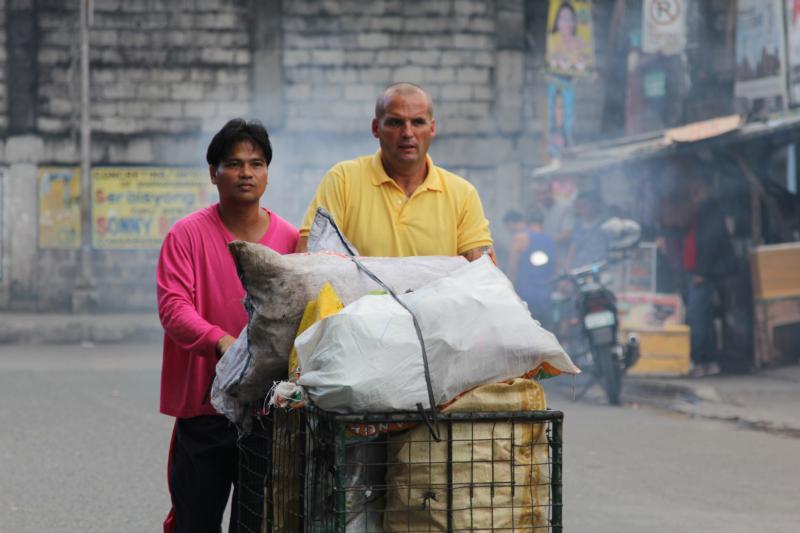
Mark Crosbie walks with Mel Macaereg in Manila, Philippines, in this undated photo. Crosbie, an Irish Catholic street cleaner who was filmed for a job-swap TV documentary, has pledged to spend the rest of his life helping the struggling family he lived with in Manila. (CNS photo/courtesy RTE)
by Nick Bramhill
DUBLIN (CNS) — An Irish Catholic street cleaner, who was filmed by a TV documentary crew as he temporarily swapped his job in the Irish capital for the poverty-stricken Philippines, has pledged to spend the rest of his life helping the struggling family he lived with.
Mark Crosbie, a street cleaner with Dublin City Council, told how his perspective on life has changed forever since he spent a few days cleaning the streets of the Philippines’ densely populated capital, Manila, for an Irish TV documentary, “Toughest Place To Be.”
As part of the program, which was watched by 330,000 viewers when it was screened in mid-April ago on RTE, Ireland’s state broadcaster, the 47-year-old father-of-two stayed with the family of a local street cleaner, Mel Macaereg, who earns $15 a week to support himself, his wife, Merney, and their six children.
But since filming ended in January, Crosbie has maintained weekly contact with his host family and has set up a charity drive to raise funds for the wider community that took him in.
Crosbie, who sweeps the cobbled streets of Dublin’s Temple Bar district for a living, said: “The poverty I saw over there was on a level I’d never seen before, and I struggled to adjust to life back in Dublin when I came back. I was scarred by it, but it was a positive scar.
“The people I met had literally nothing, yet they embraced me and looked after me like I was one of their own. They were probably the warmest and most generous people I’ve ever come across.
“I felt very emotional when I said my goodbyes to the family and I left them everything I had brought over with me, because I felt it was the least I could do. That wasn’t shown in the documentary, but I left my possessions on the bed I’d been sleeping in — clothes, toys for the kids, biscuits, coffee and about $450 in cash. I’m not looking for any credit for that, it was just the right thing to do.
“If I’d have had $10,000 with me, I’d have left them that too,” he added.
Crosbie said he would love to help everyone he met in the Philippines, “but obviously I can’t make things better.” He added he planned to do a sponsored climb of the holy mountain Croagh Patrick in August to raise money for the community.
Manila is home to 25 million people, 4 million of whom live in slums.
In the documentary, Crosbie witnessed firsthand the daily hardship facing thousands of people. He visited a city dump, where hundreds of impoverished people spend their days searching through rubbish for items they could sell.
“Going over there was probably the best thing I’ve ever done. It opened my eyes in a way I could never have imagined,” Crosbie said.
“I found it very hard for the first couple of weeks when I returned to work in Dublin. The things people were moaning about really didn’t seem to matter in comparison.”






